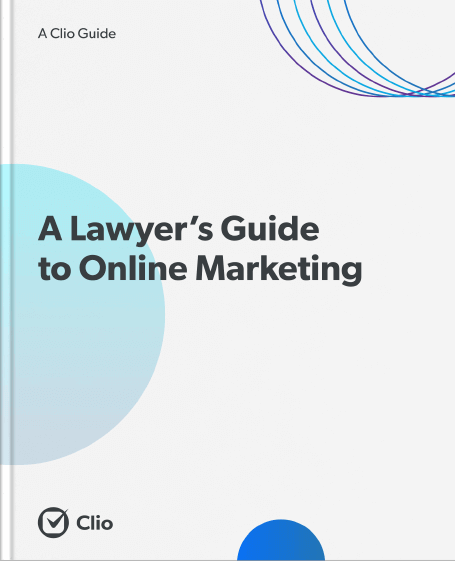In a vast sea of legal blogs, how do you stand out?
We reached out to Kevin O’Keefe, CEO and Founder of LexBlog, a blogging platform for lawyers, for some of his best practices on legal blog writing.
His first—and most important—piece of advice? Start a niche publication. Read on as we share his top tips for elevating your legal blogging efforts.
Why lawyers should be blogging
Perhaps you’re wondering if it’s even necessary to attract people to your site. You wouldn’t be the first.
As a lawyer, you’re bound by strict regulations regarding advertising for your services. How do you show your clients that you’re a skilled and capable lawyer—while promoting your services to an extremely diverse pool of prospective clients?
Well, there’s a way that accomplishes all this—and more. It’s simple. It makes your law firm’s website easier to find online by people who are looking for legal services. And it costs you nothing.
Yes, you guessed it—it’s a blog.
Can a lawyer be a blogger?
Of course!
In fact, scores of lawyers are blogging to reach new clients, grow their firm, enhance their brand, and much more.
According to the 2022 ABA Legal Technology Survey Report, 37% of law firms report having a blog. This number climbs to 60% for firms with 100 or more attorneys. What’s more, when asked whether a client has retained legal services directly or via referral because of their firm’s blogging efforts, 34% indicated they have.
Whether you work with hundreds of lawyers in Big Law or for yourself, your law firm should be actively blogging. As Kevin explained, building one’s authority and reputation through legal blog writing should come above all else.
The best way to do that, he says, is to focus on a niche you have a lot of experience in or feel strongly about. Having a successful blog can come with real benefits for your legal career.
“You get known. You get recognized. You get cited. You get invited to speak at conferences, and in time (within a couple of years) you don’t worry about the mortgage, putting the kids through college, going on nice vacations when you take time off, or getting to work with the type of clients you want on the type of matters you want to work on. You are a lawyer’s lawyer.”
Here are a few tips for successful legal blog writing based on our exchange with Kevin.
1. Select a niche topic
When getting started on blogging, it’s important for lawyers to actually focus on a niche topic. The more you can narrow it down, the better.
“In 13 years at LexBlog, we have never had a lawyer say what they were doing was too niche,” Kevin said.
A blog that simply focuses on a specific practice area, such as employment, tax, or environmental law, would be too broad. Focusing on a small geographical area would be a better strategy. For instance, Kevin pointed to Kysa Crusco of Bedford, New Hampshire, who’s done extraordinarily well building her name as a family lawyer in her small city through her New Hampshire Family Law Blog.
If you’re in a larger city, focusing on a specific passion you have within your practice area could be a winning strategy. For example, Dallas family lawyer Michelle May O’Neil doesn’t just write a family law blog: She publishes both the Dallas Divorce Law Blog and a blog titled Gay and Lesbian Family Law in Texas.
Bonus tip: If you need more help defining a niche for your legal blog, follow the steps in this post from Kevin.
2. Put quality before SEO
Having a blog can help with your website SEO, and by extension, help potential clients find you online. It’s inbound marketing at its finest.
However, Kevin is adamant that this isn’t what’s most important. Lawyers should worry less about SEO and more about writing quality posts.
“You need not worry about search. That’s a byproduct of sharing information that’s helpful in an engaging way—information that is likely to get cited and shared because people of influence [have eventually come to] know you and trust you, and they see you giving of yourself in a real and authentic way.”
For more tips on how to balance SEO with quality legal writing,check out our resources in the digital marketing hub.
3. Join the conversation
If you’re focusing on an ultra-niche area, it might sometimes seem difficult to think of a topic to write about—especially if you’ve been at it for a while.
For Kevin, however, “blogging is not about thinking of things to write … blogging is a conversation.” By keeping an eye on current events related to your niche and adding your commentary, he says you’ll never be stuck for a subject to write on, even if you’re blogging about an extremely focused topic.
Kevin suggests using news aggregators or Twitter lists to keep track of what’s going on in spaces related to your area of practice, sharing the news, and adding your commentary. If you do very well at it, your side of the story may even be picked up by news outlets.
4. Write for your clients
Don’t use your legal content as a megaphone to shout the merits of your firm in cyberspace. That’s probably worse than not having a blog.
A good blog (and likely, the blogs that you enjoy reading) offers useful information, sometimes presented in an entertaining way.
To achieve this:
- Write out the questions your clients have asked you. This could be about certain cases, or about the practice of law in general.
- Then, create a list of various articles that you can write to provide clear and compelling answers to these questions.
Ultimately, you want to make yourself a resource that people who are interested in law—or who need a lawyer—would bookmark and come back to repeatedly.
For example, if you work in real estate law, try writing a post on what kind of properties your clients should avoid.
5. Start your legal blog writing journey
As with anything, one of the most important parts of blogging for lawyers is simply to get started.
As you do, don’t worry about every post being perfect. It’s more important to start getting posts out there so you can learn as you go.
Follow these steps, and you’ll be well on your way:
- Get a blog (WordPress is one of the best platforms) and give it a name that makes sense. Your law firm name or practice area is a good place to start.
- Sit down with a notepad and write down your areas of expertise and law-related topics that you’re interested in. Start with five. If you actually like what you’re writing about, blogging becomes a much easier (and dare we say more fun) process. Seriously.
- Set yourself a deadline every week to get a post up. Consistency will help you keep up your writing habit.
- Start posting. Be professional, but also let your personality permeate your writing. This is your blog and your space to share information with people who know nothing about you. How do you want your law firm’s brand (and your personal brand) to come across?
Learn about the best blogging platforms for lawyers to get started: Best Blogging Platforms for Lawyers
The power of blogging for lawyers
When done right, a legal blog can help build authority and trust with your potential clients, and with industry influencers who may share your writing more widely. And, as Kevin notes, starting a niche blog is definitely not as scary as some legal professionals may think.
The biggest mistake he sees when it comes to blogging for lawyers?
“Thinking it’s too hard to do their own blogging on a niche,” Kevin said. “Legal marketers, who have never really blogged, leave lawyers’ heads spinning when it comes to blogging. It’s not that hard—share what you are reading from your news aggregator, properly attribute the source, and provide your take.”
Take a look at your practice, choose your niche, and start writing. You won’t regret it. To inspire your thinking, we recommend checking out our list of the best legal blogs of 2022.
Law firm marketing experts share their top tips - for free
Get law firm marketing tips from experts Gyi Tsakalakis, Josh King, and Kevin O'Keefe in our free ebook.
Get the Guide

